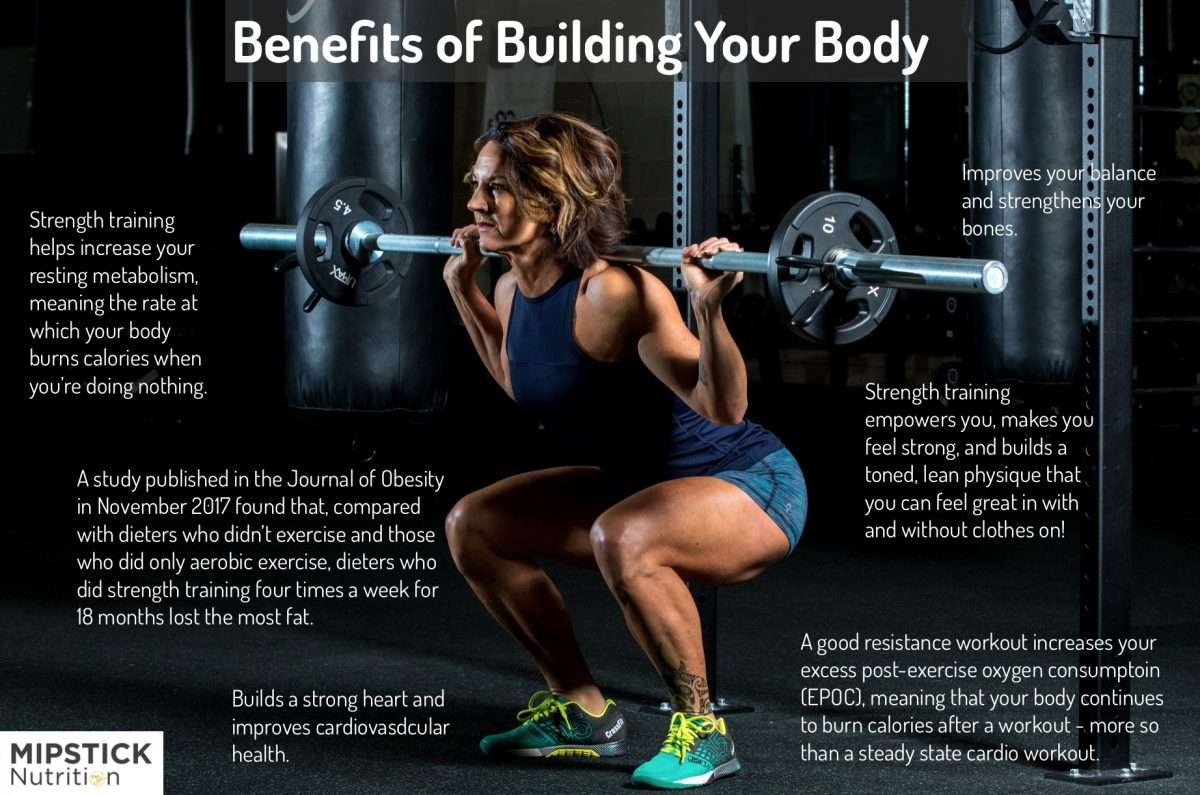November 22, 2020
Originally published in January 2017, updated and made more awesome in November 2020
You don’t need to be a bodybuilder to reap the tremendous health benefits of strength training.
Nor do you have to join a gym.
Nor buy super-fancy equipment.
Nor be intimidated by the words body builder or weight lifting.
Let’s define those terms and explore the reasons why I recommend lifting weights (a.k.a. “resistance training”) for people of all ages.
But first, DID YOU KNOW that after age 50 you start to lose 1% or more of your muscle mass per year? That’s up to 30% loss by the time you’re 80! So the more lean muscle mass you have before age 50, the better.
If you’re over the age of 50, the more you lift weights, the slower your rate of loss will be. Why settle for 1% loss, when you can keep your strength even longer?
Lifting weights is not just about muscle “mass” and “strength” though. It’s a great way to maintain good health for just about everyone at any age, whether you’re athletic or not.

Here are five key health factors that are improved with increased muscle mass.
#1 – BOOST YOUR METABOLISM
Yes! We all want a nice, healthy metabolism to help us maintain a trim physique, right? We want to have energy, and be able to burn the right amount of calories from our foods. Muscles are quite magical in this regard – they can burn more calories than fat tissue, even when they’re not working! (Who doesn’t want this?)
Reduced muscle mass is associated with increased fat stores, as well as increased inflammation.
So… lifting weights builds up your muscles so they become more efficient metabolism-boosters, calorie burners, as well as helping your body store less fat and control inflammation.
#2 – STRENGTH TO DO EVERYDAY THINGS
Lifting your groceries.
Mowing your lawn.
Carrying things up from the basement.
You might take these things for granted now, but one day they will be very important. These everyday things help us maintain our independence. They’re things that we’ll be able to do on our own for longer if we have healthy muscles to rely on.
#3 – MANAGING YOUR BLOOD SUGAR
Diabetes. Insulin resistance.
When your body has trouble maintaining healthy amounts of sugar in your blood (not too much, and not too little), this can cause both short- and long-term issues.
Short-term issues can include things like fatigue, brain fog and increased appetite (and subsequent weight gain). Long-term issues are the potential for insulin resistance, or even diabetes.
Having healthy, strong muscles actually helps your body maintain proper blood sugar control? Muscles can store and burn excess blood sugar, therefore helping to keep blood sugar levels in just the right place.
#4 – MAINTAINING BONE HEALTH
As you may know, 1 in 3 women and 1 in 5 men end up with osteoporosis. This results in bones that break easily, even from a simple slip on soft grass or carpet.
Muscles help your bones stay strong.
When you work your muscles through strength training they gently pull on your bones. This sends signals to your bone-building cells that they are needed to support this muscle movement, and this is the trigger that promotes the formation of new bone growth. Strength training = new bone growth.
This doesn’t happen so much when muscles aren’t pulling on the bones. It’s this tension on the bone that creates the formation of new bone. And that is a very, very good thing as we age.
When our muscles get weaker from lack of use, the bones follow suit. Strength training also improves balance and reduces the risk of falling in the first place. Win-Win 👊🏼

#5 – LONGER LIFE, BETTER QUALITY OF LIFE
If none of the above reasons resonate with you (but they probably do…), then this one will surely get your attention.
Fact: Numerous studies show that more muscle mass and strength as we age is directly associated with longer life AND better quality of life.
Read that one again…

STRENGTH TRAINING vs WEIGHT LIFTING vs BODY BUILDING
I get it, weight lifting seems intimidating if you’ve never done it. Or perhaps you’re just not interesting in body building. Fair enough. Or maybe you have no idea what any of it even means! Let’s define.
Strength Training (aka Resistance Training): a form of physical activity that is designed to improve muscular fitness by exercising muscles against resistance. That resistance may be your own body weight (ie: a push-up or squat) or any objects (dumbbells or barbells, tubing or bands)
Weight Lifting: the sport or activity of using barbells or other heavy weights to increase muscular size and strength
Body Building: serious weight lifting 💪🏼 a sport involving strenuous weight lifting, focused intentionally at building the muscles of the body for a desired strength and/or aesthetic
You can see that the difference is really about the intention and the methodology used, but it’s all about working your muscles. The common purpose is to exert effort against resistance in order to strengthen and build muscle, to varying degrees for each. So you need not be a bodybuilder or weight lifter to reap the many health and metabolic benefits of building muscle. You need only include strength training, aka resistance training, into your exercise regime. That may happen inside or outside of a gym setting. It could be at home, at your boxing, yoga or dance studio. Again, any activity that incorporates using a resistance to work your muscles is strength training and will provide endless benefits!
CONCLUSION
Bodybuilder or not, you can and should lift weights or do resistance training to maintain good health. Blood sugar and weight management, bone health, maintaining independence longer in life, improved balanced and reduced injuries, and improved quality of life are among the many reasons strength training benefits us at all ages.
Dumbbells or soup cans, in a gym or in your living room, start working those muscles today!
Need help getting started on a strength training program? Let’s connect, we know people 😉
Lifting Weights Not Just for Bodybuilders
The entire contents of this website are based upon the opinions of Build Holistic Nutrition. Please note that Build Nutrition is not a dietitian, physician, pharmacist or other licensed healthcare professional. The information on this website is NOT intended as medical advice, nor is it intended to replace the care of a qualified health care professional. This content is not intended to diagnose or treat any diseases. Always consult with your primary care physician or licensed healthcare provider for all diagnosis and treatment of any diseases or conditions, for medications or medical advice, as well as before changing your health care regimen.
© BUILD NUTRITION 2026. ALL RIGHTS RESERVED. PRIVACY POLICY
Go ahead, creep us on social. You know you want to!
